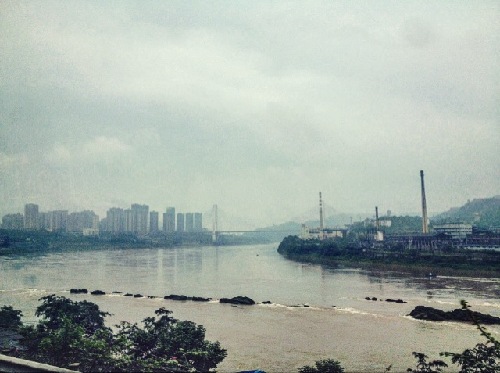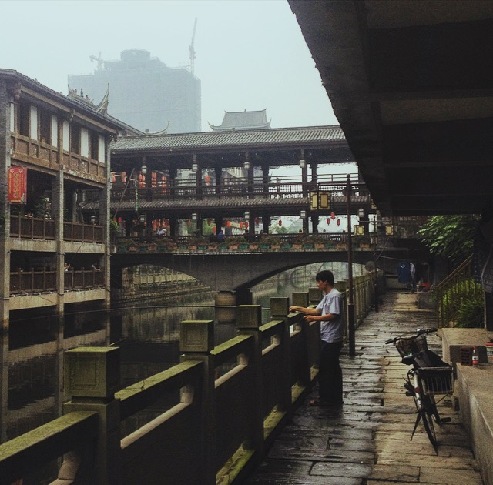
Yibin along the Yangtze
|
|
|
View of residential Yibin from across the Yangtze River [By Kyle Allen Calandra/China.org.cn] |
Looking along the causeway in Yibin City’s newly constructed “Nanxi Old Town”, local tour guide ‘James’ lights a cigarette under the shelter of his umbrella. “All of this is brand new,” he says, through a cloud of smoke. “It’s part of a massive government investment project”.
A light rain is falling, and the early morning fog is just beginning to lift off the Yangtze River, only a short walk away.
Heralded by locals as the first city founded along the 6,400 km-long river, Yibin in southern Sichuan is, like China, rising out of the fog of 20thCentury setbacks into a new era of unparalleled growth. “This district in Yibin, Nanxi, used to be a county only a few years ago,” says James. “It’s incredible how fast everything is changing.”
He smiles, motions to the surrounding construction projects, and says “O-B-O-R,” referring to the “One Belt, One Road Initiative” proposed by Chinese President Xi Jinping in 2013.
|
|
|
A fisherman casts out into the causeway running through Nanxi District's newly-constructed "Old Town". [By Kyle Allen Calandra/China.org.cn] |
Envisioned as a means of recreating the once prosperous Silk Road trade route linking China and Eurasia, the initiative is aimed at encouraging development, trade, investment, connectivity and cooperation. More specifically, it represents an economic development framework composed primarily of the “Silk Road Economic Belt” together with the “Maritime Silk Road.”
While not aimed at these regions directly, areas in outlying China have been spurred on by the country’s larger initiatives. In the case of Yibin, the local government quickly realized the economic initiatives represented a chance to take advantage of what policymakers refer to as “historic opportunities for a new round of Western development.”
Recently, the 2015 Sichuan International Cultural Tourism Festival was held for the first time in Yibin. It represents an important platform for the area, as Sichuan is widely considered one of China’s leading travel destinations attracting both foreign and domestic tourists. The Festival hinted at the scope and magnitude of the region’s economic development.
Speaking at the Festival’s opening ceremony, Mr. Wei Hong, Vice Secretary of the CPC Sichuan Provincial Committee and Governor of the Sichuan Provincial People’s Government said: “The Chinese government has heavily emphasized economic development. I hope that foreign and domestic guests will take full advantage to strengthen exchanges, deepen cooperation and achieve mutual benefits”. It’s a sentiment shared not only by policy makers and prospective investors, but local Chinese citizens as well.
|
|
|
Clouds part for a moment above the pagoda in Nanxi District's Old Town. [By Kyle Allen Calandra/China.org.cn] |
“I’m local. I’m from Yibin, but I’ve lived in Shenyang for the last seven years,” says James. Having graduated from the Shenyang University of Technology, he’s only recently returned to his hometown. “Everything here is new and I think it’s wonderful to see.”
Yibin is a city of roughly four million people, and it’s impossible not to feel the impact that recent economic changes have brought them. Modern high-rise architecture tower over the city’s metropolitan center, casting imposing figures against the backdrop of Sichuan’s sloping, verdant hills and riverside factories. Recent economic development has seemingly imbued the region and its people with a kind of worldly, international perspective, and an expanding identity that seems to perfectly embody China’s advancing ambitions.
Two ancient rivers meet in Yibin. Only a tributary, the Min empties into the mighty Yangtze flowing ceaselessly eastward. Known in modern times as the first settlement along the Yangtze, Yibin is where China’s illustrious past is being drawn towards the unyielding current of its future. It’s a future that is full of promise, with everyone in the world now looking eastward, towards China.
Walking along the “Nanxi Old Town” causeway, James stops to put out his cigarette. The rain stops falling for a moment and the water is perfectly still. “These days are all about the future,” James says, and he lights another cigarette.











